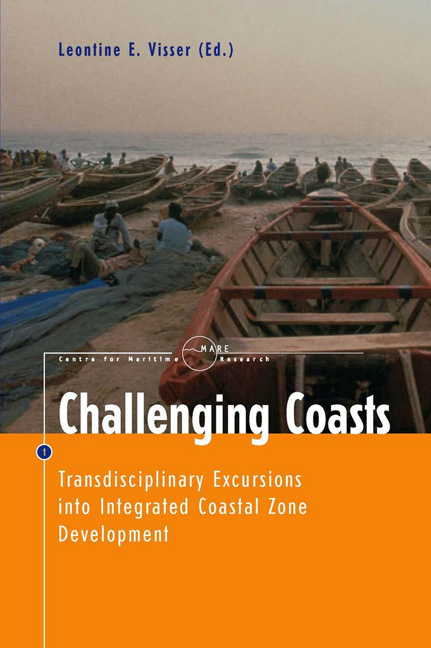Book contents
- Frontmatter
- Series Foreword
- Contents
- Acknowledgments
- 1 Introduction
- 2 Reflections on Transdisciplinarity, Integrated Coastal Development, and Governance
- 3 Biodiversity and the Natural Resource Management of Coral Reefs in Southeast Asia
- 4 A Concerted Approach towards Managing Living Resources in a Marine Protected Area
- 5 ‘Making Do’: Integrating Ecological and Societal Considerations for Marine Conservation in a Situation of Indigenous Resource Tenure
- 6 Basic Principles Underlying Research Projects on the Links between the Ecology and the Uses of Coral Reef Fishes in the Pacific
- 7 The Marine Implementation of the EC Birds and Habitats Directives: the Cases of Shipping and Oil Exploration Compared
- 8 Stakeholder Conflicts and Solutions across Political Scales: the Ibiraquera Lagoon, Brazil
- 9 ‘The Rich Eat Fish and the Poor Eat Pork’: The Decline of the Livelihoods of Handpickers of Aquatic Organisms in North Vietnam
- Index
- List of Contributors
5 - ‘Making Do’: Integrating Ecological and Societal Considerations for Marine Conservation in a Situation of Indigenous Resource Tenure
Published online by Cambridge University Press: 28 January 2021
- Frontmatter
- Series Foreword
- Contents
- Acknowledgments
- 1 Introduction
- 2 Reflections on Transdisciplinarity, Integrated Coastal Development, and Governance
- 3 Biodiversity and the Natural Resource Management of Coral Reefs in Southeast Asia
- 4 A Concerted Approach towards Managing Living Resources in a Marine Protected Area
- 5 ‘Making Do’: Integrating Ecological and Societal Considerations for Marine Conservation in a Situation of Indigenous Resource Tenure
- 6 Basic Principles Underlying Research Projects on the Links between the Ecology and the Uses of Coral Reef Fishes in the Pacific
- 7 The Marine Implementation of the EC Birds and Habitats Directives: the Cases of Shipping and Oil Exploration Compared
- 8 Stakeholder Conflicts and Solutions across Political Scales: the Ibiraquera Lagoon, Brazil
- 9 ‘The Rich Eat Fish and the Poor Eat Pork’: The Decline of the Livelihoods of Handpickers of Aquatic Organisms in North Vietnam
- Index
- List of Contributors
Summary
Introduction
The establishment of protected areas is based on the notion that ‘wild’ nature needs to be kept separate from human society in order to preserve it and that it is the duty of the State and its agencies to restrict the use of ecosystems in need of protection (Peluso 1993; Colchester 1994). In this view, protected area establishment and management are largely ‘technical’ matters and the realm of natural scientists such as ecologists, biologists, and conservation managers. These scientists assess the ecological significance of potential protected areas on the basis of ecosystem characteristics, species composition, endemicity, levels of disturbance, and the like. Subsequently they design a protected area on the basis of considerations of size, shape, habitat variability, the requirements of specific species, and so on. Once these technical matters have been settled conservationists come to deal with the local people, often by excluding them from previously accessible resources in order to conserve nature in the area of their choice (Van Helden 2001a).
The debate over the position and involvement of local people within and around protected areas has mainly focused on land-based protected areas and national parks. Whereas in the 1980s tropical rainforests came to be seen as the symbol of biological diversity, in recent years there has been a shift towards the realisation that the oceans and their marine life are at least as diverse and vulnerable. Coral reefs are nowadays popularly referred to as the ‘rainforests of the seas’. This realisation has led to a shift in attention from landbased interventions towards a variety of marine conservation and coastal management programmes. Large private foundations and non-governmental organisations are now developing a variety of programmes aimed at establishing marine protected areas in a range of tropical countries. In doing so, these programmes are confronted with the fact that the livelihoods of coastal people are often dependent on the use of marine resources. Simply designing protected areas on the basis of ecological considerations often intensifies the tension between the economic needs of local communities and the conservation goals of these programmes.
In recent years, the traditional model of state-induced protected area establishment has been challenged for both moral and practical reasons. Morally, because it has often meant that the opportunity costs of conservation are imposed on poor people living inside and around protected areas.
- Type
- Chapter
- Information
- Challenging CoastsTransdisciplinary Excursions into Integrated Coastal Zone Development, pp. 93 - 118Publisher: Amsterdam University PressPrint publication year: 2004



